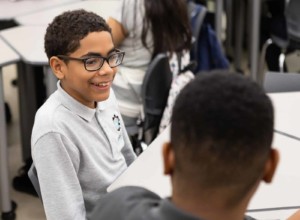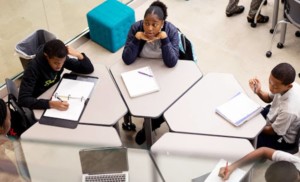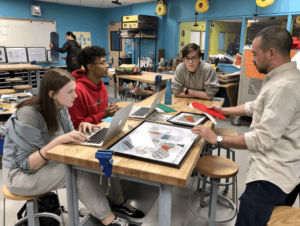20 Schools and Networks That Educate With A Sense of Place

Place-Based Education (PBE, #PlaceBasedEd) is an approach to learning that takes advantage of geography to create authentic, meaningful and engaging personalized learning for students.
More specifically, PBE is defined as an immersive learning experience that “places students in local heritage, cultures, landscapes, opportunities and experiences, and uses these as a foundation for the study of language arts, mathematics, social studies, science and other subjects across the curriculum.”
There are three timely reasons to consider place-based lessons or full school transformation:
- With a focus on broader aims and #RedefiningReady, PBE connects kids to their community and builds relationship skills;
- Engaging and challenging projects prepare young people for this project-based world; and
- Mobile tech powers anywhere anytime learning and augmented reality (e.g., Pokemon Go) and virtual reality are becoming more available and extending the power of immersive learning.
This post includes an illustrative (not exhaustive) list of schools that leverage local assets including parks and museum. It represents the diversity of place-based schools: rural and urban; district, charter, and independent; US and international. It’s organized by themes and networks.
Environment
 1. Teton Science Schools is a 50-year old nonprofit organization in northwest Wyoming with place-based education as a core mission. Their approach is community-connected, partnership-focused, inquiry and design-based, student-centered and interdisciplinary (see feature).
1. Teton Science Schools is a 50-year old nonprofit organization in northwest Wyoming with place-based education as a core mission. Their approach is community-connected, partnership-focused, inquiry and design-based, student-centered and interdisciplinary (see feature).
“Instead of asking students to wait for 20 years to really understand the “why” behind school, students should spend twenty years as integral and participatory members of learning communities,” said Nate McClennen, Vice President for Education and Innovation (and our partner for this #PlaceBasedEd series).
2. The Environmental Charter School (@ECSInnovator) in Pittsburgh is a good example of a school promoting Deeper Learning with powerful questions and applied learning–often in 561 acre Frick Park next door. Thinking Lab is a cool art and STEM mash-up space. The school seeks to “foster knowledge, love of and respect for the environment and the will to preserve it for future generations.” ECS believe that connecting student learning to an authentic, place-based experience sets the stage for deeper student learning – which means they are using their knowledge and skills from multiple disciplines in a way that prepares them for real life.
 3. Eagle Rock is a great small high school in Estes Park Colorado that takes full advantage of Rocky Mountain National Park.
3. Eagle Rock is a great small high school in Estes Park Colorado that takes full advantage of Rocky Mountain National Park.
4. There are at least a dozen preschool programs in the Seattle area that have an outdoor focus. Preschoolers at Fiddleheads Forest School at Seattle’s Washington Park Arboretum (pictured right) are outdoors for every minute of their four-hour school day. The outdoor nature-based program focuses on play and exploration, as children engage with the world around them the staff supplements with curriculum to further engage their curiosity.
Marine Science
5. Puget Sound Skills Center, just south of Seattle teaches a marine biology course that meets at Seahurst Beach
6. Highline Community College hosts college classes and field trips Marine Science and Technology Center.

7. The Maritime Discovery Schools is a districtwide place-based initiative in Port Townsend Washington.
Zoo Schools
8. The School of Environmental Studies, or “Zoo School,” is on the grounds of the Minnesota Zoo and embraces project-based learning with an environmental theme. A partnership between the city, the school district, and zoo. In addition to studies at the zoo, SES students take excursions around the world “to immerse students in new climates, cultures and environmental issues.
9. Science and Math Institute at Pt Defiance zoo in Tacoma partners with “community resources to change public education, emphasizing creativity and utilizing a fully inclusive model that educates the whole student through shared values of community, empathy, thinking, and balance.

Museum Schools
10. Tacoma School of the Arts has active relationships with each of the museums in downtown Tacoma. They are teaching classes at Tacoma Art Museum and the LeMay Car Museum. This year a full-time arts liaison will strengthen relationships between the city, museums and the school. (The calculus class is visiting the Glass Museum, right)
11. Houston A+ UP was launched three years ago as a small pilot middle school and will expand as a charter network this fall. Every week, A+UP students ride public transit to visit an amazing network of museum and community partners (see feature).
12. Led by former school superintendent Donna Deeds, The Museum at Prairiefire partners with Kansas City schools to bring natural history to life. Listen to a podcast where Deeds describes this regional place-based learning gem and CAPS (see feature), the work-based initiative she created before joining the museum.
City as School
13. Metro Charter Elementary in rapidly developing downtown LA leverages neighborhood resources – parks, cultural centers, businesses and rich historical sites – to provide meaningful learning opportunities and enhance the experiences for diverse students. Kids take public transit for field trips and visit places like City Hall and Disney Concert Hall.
14. Horace Mann Elementary in Washington DC has food gardens and a university partnerships. The entryway includes a garden wall with art that spells out values evident in every room of Horace Mann: adventure, discovery, inspiration, and imagination. (See feature and listen to the podcast about their design principles.)
15. E3 Civic High School is housed in the spectacular new San Diego library.
School Networks
16. The Idaho P-Tech network is 17 rural high schools creating business partnerships for career pathways.
17. Expeditionary Learning Schools link learning to real-world issues, students engage in projects that yield solutions for audiences beyond the classroom—“real work for real audiences.” (See feature on Casco Bay High School in Maine and the first EL charter in NYC)
18. The 200 New Tech Network schools share a project-based approach that often leverages local assets and business partnerships. (See feature on an environmental project and internship program and picture, below, from Katherine Smith Elementary).

19. Big Picture Learning schools build internships around student interests. (See feature on how Big Picture uses local resources to personalize postsecondary readiness.)
20. Earth Force prepare youth to be active participants in addressing environmental challenges so that their communities are resilient today, tomorrow, and throughout their life. Earth Force focuses on water, sustainability, and health in 52 communities throughout the U.S. and Canada:
For more see
- A Place-Based Education (PBE) Thought Leadership Campaign (info on contributing)
- Genius Loci: Place-Based Education & Why It Matters
- Place-Based Education: Communities as Learning Environments
This blog is part of our “Place-Based Education” blog series. To learn more and contribute a guest post for the series, check out the PBE campaign page. Join in the conversation on social media using #PlaceBasedEd.
Stay in-the-know with all things EdTech and innovations in learning by signing up to receive the weekly Smart Update. This post includes mentions of a Getting Smart partner. For a full list of partners, affiliate organizations and all other disclosures please see our Partner page.





Tom Vander Ark
Add XQ winner Grand Rapids Public Museum High School to the list
Wes Davis
What a great resource! This list shows how PBE can work for students of all ages and interests. Check out Blue Dot Education http://www.bluedoteducation.org - a San Diego non-profit that combines place and space :) twitter: @bluedot_ed